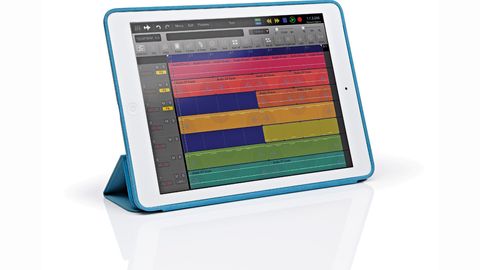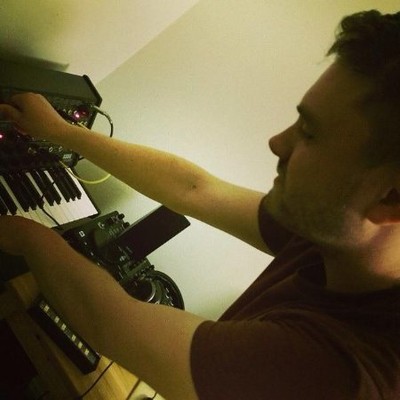First unveiled at NAMM 2015, Auria Pro builds upon its predecessor's aim of bringing a pro-level DAW environment to iPad.
While the concept of an iOS DAW isn't new - GarageBand, Cubasis and the original Auria all offer some form of mobile production environment - Auria Pro is the most impressively spec'd and ambitious offering we've seen to date. So much so that, on paper, there's little to differentiate its feature set from that of one of its fully-fledged desktop counterparts.
As with the original Auria, which first hit the App Store back in 2012, Auria Pro is based around a dual section workspace with Mix and Edit views. It can record audio at a range of sample rates up to 96kHz via either the built-in mic or an iPad-compatible audio interface.
There's a comprehensive multi-track sequencer in the arrangement-focused Edit view, while the Mix window features a virtual mixer offering flexible buss routing and up to six effects slots per track, plus six auxiliary send effect slots.
On the effect front, Auria can utilise a broad range of third-party plug-ins, either natively or via Inter-App Audio.
It comes bundled with effects plug-ins including convolution and algorithmic reverbs, chorus and delay plug-ins from PSP, and PSP's excellent ChannelStrip, which features Expander, EQ and Compressor modules - all of which will be familiar to current Auria users.
Going Pro
This new 'Pro' version builds on its predecessor's capabilities in a number of ways. Most notably, it introduces MIDI tracks with extensive sequencing capabilities such as a piano roll editor, real-time quantise, flexible automation and Virtual MIDI compatibility for use with external apps.
To take advantage of these MIDI capabilities, Auria Pro comes equipped with a trio of plug-ins: Lyra, WaveMachine Labs' own sampler instrument, and FabFilter's One and Twin 2 synths.
Lyra comes with 4GB of free sample content, most of which is available as an optional download once Auria is installed, which handily avoids clogging your iPad up with unnecessary content if you're not interested in all of the bundled sounds.
You can also load your own samples too, with Lyra supporting SFZ, EXS and SF2 formats. In use, it's a solid and well-equipped sampler, although the built-in distortion is a little weak and it had the disappointing effect of sucking all the life out of the drum samples we tried it on.
The two FabFilter synths, meanwhile, are excellent additions. One is a basic but very usable single oscillator synth, while Twin 2 is the full version of FabFilter's 2009 virtual analogue synth plug-in, its simple interface and flexible sound making it an ideal choice as a stock synth for Auria.
For the most part MIDI tracks have been well implemented and function as you'd expect, although we'd suggest it's advisable to use some form of iOS compatible controller to get the most out of Auria Pro.
"The app undoubtedly raises the bar for what we can expect iOS workspaces to be capable of."
While, to its credit, WaveMachine Labs has done a decent job of making the piano roll editor as flexible as possible - with both two varieties of input gestures and a broad range of editing options - ultimately, using a piano roll with a touchscreen isn't a particularly fluid experience and (call us a Luddite) it left us crying out for a mouse and keyboard.
Other major additions include audio warping and time-stretching courtesy of élastique Pro v3. Making timing adjustments is a smooth and intuitive process, with impressive results on all the sound sources we tested.
It's not as flexible as the warping in, say, Ableton Live but, for an iOS DAW, it's very impressive and more than capable enough at tidying up recordings and tweaking imported sounds.
Auria Pro also adds groove extraction, audio quantise, a stock pool of groove templates and audio transient to MIDI conversion. This version adds global tempo and time signature tracks too.
Pushed to the limit
While the processing power of iPads has come on in leaps and bounds in the past couple of years, unsurprisingly older generation devices are going to struggle with something as complex as Auria Pro.
WaveMachine Labs recommend a fourth generation iPad or later, and the app requires at least iOS 6 to run.
We tested Auria Pro on an iPad Air 2, and were generally very impressed by the stability. That's not to say we didn't experience crashes - particularly with multiple MIDI tracks and IAA instruments loaded, the iPad began to struggle - but WaveMachine Labs has clearly put a lot of effort into wringing he maximum amount of processing power out of the device.
Additionally, Auria Pro gives users a number of handy tools to overcome overload issues, such as a reliable CPU meter, track freeze, bounce in place and back-up support for iOS compatible hard drives. It's worth noting too that with Auria's autosave capabilities, at no point did we lose any work due to a crash.
WaveMachine Labs claims that Auria Pro redefines mobile music making and, remarkably, that's a largely justifiable claim.
While it's not perfect - we feel there's still a little work to be done on tailoring the UI to suit working on a touchscreen - the app undoubtedly raises the bar for what we can expect iOS workspaces to be capable of.
Can Auria Pro rival your trusted desktop DAW? Not quite just yet - but it certainly comes remarkably close.


